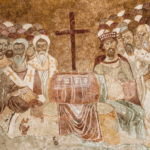This is the appendix of a short series on the nature of gender. Click here to see the posts in the series
Participation is everywhere in the Bible once you start to notice it. Here are some different examples and forms. In each case we see that there is an order—one person comes from and shares in another—but also that both participate in each other’s lives.

Patriarchal
Old Testament covenants assume that a man’s children participate in his life. That means, they inherit God’s promises to him, but also that he lives through them. Accordingly God can tell Abraham he will make him a great nation (Gen 12:2); and Ezekiel can prophesy that “David shall be king” in the future (Eze 37:24)—even though both individuals are long dead by the time these promises come to pass.
Patriarchal participation is also the structural reality that explains how we share in Adam’s nature, sin and curses
(see e.g. Gen 5:3; Rom 5:12-17 1Cor 15:48-9).

Divine Filial
The core concept of biblical (and Nicene) trinitarianism is that Jesus is God because he—as God’s Word, Image, Radiance, Stamp and Son—fully participates in everything God is and does. This relationship has basic similarities to human fatherhood—primarily because it involves a communication of nature or essence. But there are also differences: Jesus is so perfectly like his Father that to see him is to see the Father; Jesus is so connected to God that every word and action he performs is the Father speaking and acting.[1]
(see e.g. John 14:8-11)

Christological
To be a Christian is to be “in Christ” through the bonds of faith and the Holy Spirit. Because Jesus belongs to us, Christians share in his death to sin, his resurrected life, his rule, his relationship with God etc. Simultaneously, because we belong to him, he takes responsibility for our sins, shares in our sufferings and works through us to build up his body.
(see e.g. 1Cor 12:12-20; Rom 6:1-4; Eph 2:1-7; Acts 9:1-4)

Nuptial
The union of husband and wife is ordered and mutual: ordered because it is made possible by the creation of woman from and for man; mutual because the man and woman are free individuals who, in marriage, belong to each other and are members of each other.
(see e.g. Gen 2:18-2; SS 2:16; 1Cor 6:15-16; 7:4)
[1] N.b. this is the true form of what is sometimes called perichoresis—modern theologians sometimes miss the asymmetry.















